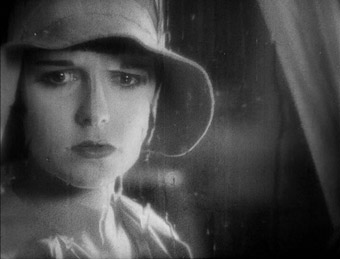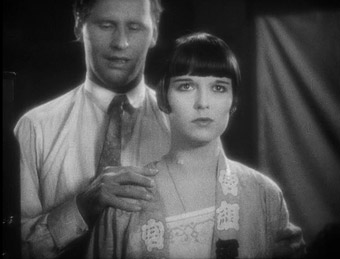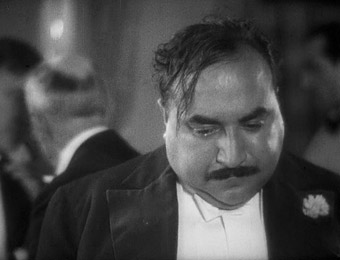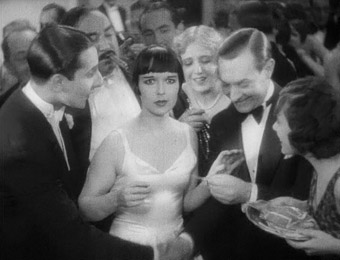|
As
a long-standing film devotee, I'm probably unusual
in that I've never fixated on any particular actor or actress,
even at a young age. Well, that's not completely true. There
was one who even in picture book stills would make me just a little dizzy
and who on screen I regarded as little short of a goddess
in human form. The woman in question was Louise Brooks and
this obsession was based on her appearance in just one film,
Georg Wilhelm Pabst's hauntingly brilliant 1929 Pandora's
Box. I was not alone in this – a close friend of years past frequently used Brooks as a yardstick by which
to measure all human beauty and always referred to the bob
cut that became so popular in the 60s through the likes
of Vidal Sassoon as "the Louise Brooks hairstyle."
Reading the booklet that accompanies the UK release of Diary
of a Lost Girl, Brooks' second collaboration with
Pabst, it's clear that our fascination with this particular
actress was not an isolated one.
There
are a sizeable number in any potential movie audience that will
instantly tune out when they realise a film is
of a certain age, and more if they know it's a product of silent cinema.
Those with limited exposure to films of this period have sometimes
narrow expectations for them, for speeded-up slapstick
or overwrought dramas with exaggerated gestures and sets
the size of small towns. What they often fail to appreciate
is the speed of cinematic development that took place in this period,
where enthusiastic and talented artists were pushing this
new medium forward on a seemingly week-by-week basis in
both technique and storytelling sophistication. Go back
to 1927 and just have a look an the astonishing
technical wizardry of Abel Gance's Napoleon –
this film wasn't just ahead of its time, it was ahead of
OUR time.

Some of the most thrilling of all late silent cinema works
emerged from Europe and especially Germany, the sometimes
fantasy-based Expressionist works of the early 20s eventually
giving way to the social realist films of the decade's close.
With the rise of fascism in the run-up to WW2, many German
filmmakers moved to Hollywood, where their contributions
were to prove key to the look and feel of early sound cinema
there. It was a different story for Pandora's Box,
a rare example of a German film with an imported American star.
Later the same year, Pabst and Brooks made their second
film together, Diary of a Lost Girl [Tagebuch
einer Verlorenen], a film I never got around to
tracking down, for which there are no excuses beyond the
usual ones of too many films and putting in the sort of
work hours that are frowned on by the Working Time Directive. Then
the film is released on UK DVD by Masters of Cinema and
a copy lands on my doormat and what do I do? I put it on
the pile and swear I will get onto it and end up missing the release
date by several months. So why cover it so long after the event?
It's simple, really – because Diary of a Lost Girl is a beautifully made and consistently compelling
drama that I suspect many others have also yet to discover.
There
is so much in this film to recommend
that it's hard to know where to begin or how much to
reveal. Let's kick off with this – right from the start,
the film treats you like a world-aware adult. Made three
years before America's Production Code put its repressive
foot down on any home grown or imported film dealing with mature themes, the directness in Diary of a Lost
Girl seems retrospectively startling.
Consider
the opening scene. A young housekeeper named Elisabeth (Sybille
Schmitz) is begging at the feet of her middle-aged employer,
pharmacist Karl Henning (Josef Rovensky), whose watching
wife contemptuously observes, "So you've had your way
with this housekeeper, too." Enter their beautiful
young daughter Thymian (the lovely Louise), who doesn't
understand why Elisabeth is leaving and no-one is about
to tell her, except for creepy shop worker Meinert (Fritz Rasp),
who keeps a collection of nude photos in his desk and clearly
has lecherous designs on Thymian. He instructs her to meet
him in the shop that evening via a note placed in the diary
she has just received as a Confirmation gift, when he promises
to explain all. Before this meeting can take place, however, Thymian is sent into a state of shock by the news that Elisabeth has taken her own life, which fails to stop Karl from making his first moves on her newly arrived and willing replacement Meta (Franziska Kinz). Later that evening the still
distraught Thymian decides to keep her appointment with
Meinert, whose deceptive seduction prompts her to faint.
Meinert responds by carrying her upstairs to bed and raping
her.

OK,
we're not talking the sort of explicit sexual assault you
might find in modern European cinema, but the audience is
left in no doubt about just what took place after the fadeout. It's the beginning of a downward slide for Thymian, who
nine months later gives birth to the child of this unfortunate
union but refuses to name the father. The family find out
anyway by prising open her diary, but Karl's resulting anger
cuts no ice with the cocksure Meinert. The family decide
that Thymian should be kept away from her innocent child,
which they deposit with a local midwife before shipping
Thymian off to a correctional institution for wayward young
girls, a sort of 1920s German equivalent of Ireland's Magdalene
Laundries, one run by a skeletal automaton and his sadistic lesbian
wife. Can you guess who the latter takes a shine to?
Strong
stuff this may sound for 1929, but we're just getting started
here – the death of her child and a drift into prostitution
still await the unfortunate Thymian, and I won't even
go into what's happening with her father and the unpleasant
Meinert. A ray of hope arrives in the shape of Count Nikolaus
Orsdorff (André Roanne), although his failure to
succeed in anything he has tried has led to him being shunned
by his wealthy father and left to make his own way in the
world, something he does with cheer but little financial
acumen. Partly as a result, even his story takes a later
turn for the tragic.
Downbeat it may be but depressing it isn't, and it's
a sign of Pabst's extraordinary skill as a director that
even in Thymian's darkest moments she retains an innocence
and purity of heart that ensures instant and unwavering
audience identification with her plight. There's no cinematic
showing off on his part – even the more inventive shots,
as when characters are introduced from behind a raised newspaper
or a bunch of flowers, are designed specifically to economically
advance the narrative. It's a beautifully crafted
film, telling its story through sometimes perfectly judged
and consistently purposeful camerawork and editing, and providing
a most persuasive demonstration of the emotional and narrative
power of cinema as a purely visual medium.

Central
to this, of course, is Brooks herself, as electrifying a
screen presence here as she was in Pandora's Box.
Lest you be misled by my earlier admission, I'm not talking
just about iconic beauty here, but a performance whose subtlety
and depth flies in the face of commonly held belief of what constitutes the silent movie
norm. The thing is, she's not alone. Theatrical villains
and comedy relief aside (as Meinert, Fritz Rasp oozes sleaze
from every pore, while the beard-twiddling customer who
responds to Thymian's ad for 'dancing lessons' could be
straight out of Mack Sennett), the performances are as controlled
and naturalistic as any you'll find in later sound cinema
and frankly could show some of the more attention-grabbing
actors of today a thing or two. This is most keenly felt
a dance hall scene in which Thymian comes achingly close
to a reunion with her father and one of her companions,
after which the rotund Dr. Vitalis (Kurt Gerron), cries
a single, heartfelt tear for her fate and tells her "You
are now a lost girl, just as we all are lost." It's
an emotionally powerful moment, one among many, and achieved
without hitting the audience over the head for the reaction,
a skill modern western cinema appears to have largely lost
or wilfully abandoned. This is real film acting, demonstrating
a keen understanding on the part of the director and performers
of the communicative power of the mid-shot and the close-up,
and how it allows you to tell your story with a whisper
rather than a shout.
There's
so much more to say about Diary of a Lost Girl,
about the performances and the handling and the modest brilliance
of individual scenes, but this is the point to stop reading
about it and see it. If the very idea of sitting through
a German silent film from 1929 is too much for you then
it's your loss. The rest of us can only offer thanks that
there are dedicated souls out there restoring and releasing
such works on DVD, reminding us that the filmmaking art,
for all its technical development in the hundred plus years
of its existence, was actually mastered in its first thirty.
And
after all these years, do I still think Louise Brooks was
the epitome of western cinematic beauty? Oh you'd better
believe it.
Anyone
familiar with restorations of films of this vintage will
be know the problems that those attempting the task face,
with a new digital masters having to be constructed from
a limited number of prints in often poor shape, usually
with scratches, physical damage, varying exposures and missing
frames. All are in evidence here, but some sterling work
has been done to minimise their intrusive effect. Film grain
is very evident and appears almost to have been enhanced
by the digital restoration process, but in other respects
the film looks impressive for its age, with the contrast
and black levels about right and the level of detail often
surpassing expectations.

The
piano score for this release is less grandiose than a full
orchestral accompaniment would have been, complimenting
Pabst's low-key approach. The accompanying booklet suggests
watching the film without the score for maximum effect – this certainly alters the experience and does, as suggested,
focus your attention on Pabst's visual technique, although
in my house this left the film open to a soundtrack of passing
cars, the hum of a fridge compressor and the shouts of passers-by.
None
on the disc, but the usual Masters of Cinema Booklet is packed with goodies, namely enjoyable and informative
essays on the film and Louise Brooks by R. Dixon Smith and
Louella Interim, memories of meeting with Brooks by Lotte
H. Eisner, excerpts from Brooks' acclaimed movie memoirs Lulu in Hollywood and one of many letters she wrote
to theatre critic Kenneth Tynan, and a poetry-structured
recollection of the actress by Craig Keller, all illustrated
with film and archive stills. I particularly liked the instructions
at the back on how to properly format the picture for widescreen
TVs, with the incorrect stretching or reframing wonderfully
condemned simply as "unjust."
One
of that increasingly small mountain of films I just can't
be completely objective about, Diary of a Lost Girl
is one I've taken far too long to catch up with, the up
side being that I got to experience that always exciting
first viewing so recently. If you are a silent cinema devotee
then there's a good chance you'll already have Eureka's
DVD, but if you've always wondered just what it was about
Louise Brooks that so fascinates many movie fans or you
just want to see how well a story can be told without cranking
up the volume in every department, then it's a definite
pre-Christmas purchase.
|